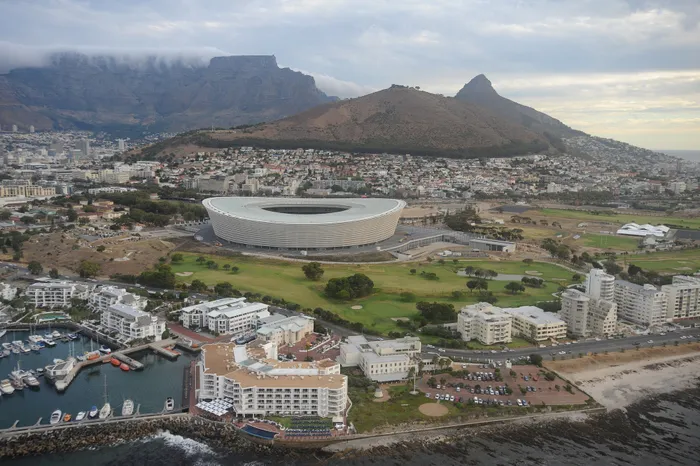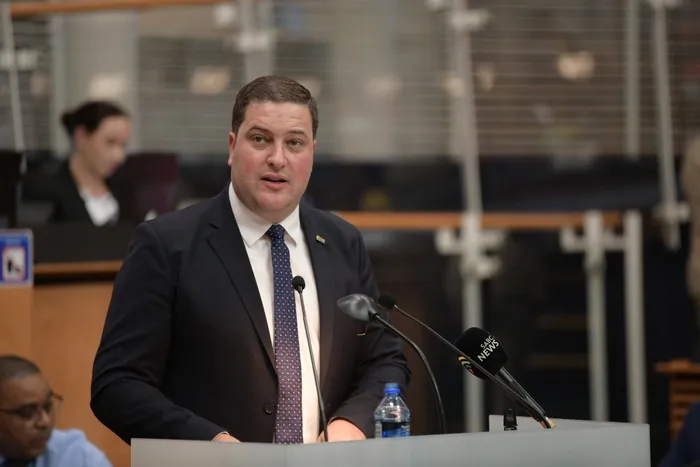Cape Town's budget battle: Mayor defends fixed charges amid legal challenges

An aerial view of Cape Town's Atlantic seaboard, including Green Point, Green Point stadium, Mouille Point and Table Mountain.
Image: Henk Kruger/Independent Newspapers
The City of Cape Town has defended its amended Hope Budget for 2025/26, after the South African Property Owners Association (SAPOA) took legal action over the City's decision to link certain fixed charges to property values.
The City’s budget has faced considerable criticism over its fixed charges and SAPOA will now be challenging this in court.
In their court papers, SAPOA CEO Nilesh “Neil” Gopal said they are seeking to challenge three items in the Budget, namely the Cleaning Tariff, the Fixed Water Charge, and the Fixed Sanitation Charge.
They are hoping to have the budget declared unconstitutional and invalid.
SAPOA’s membership currently comprises more than 90% of the country’s commercial and retail property industry, including some of the largest property-owning companies in South Africa.
The City of Cape Town filed its answering affidavit where Mayor Geordin Hill-Lewis explained that “in substance this application questions the role of the City in the determination of a budget at all and whether the City, or any other municipality, can indeed forge ahead on any new or innovative path to ensure not only better service delivery for all now, but also in the future”.
He added that City understands the concerns raised about the Budget in the proceedings and in the engagements. He said the City is aware of the relentless increases residents face in administered costs, electricity costs, municipal bills, food, fuel and household necessities, but that this has been “taken into account by the City at each step of the budget process”.
The mayor explained that they received 15,210 comments through both the March and May public participation processes related to the tariffs.
“Residents and organisations opposed the overall increases in rates and tariffs. This is not unusual. Residents from affluent areas and organisations representing property developers argued that the increases were inequitable and amounted to excessive cross-subsidisation of subsidised services.”
Hill-Lewis, in his affidavit, said that the City did not lightly decide to impose the three fixed tariffs which are the centre of SAPOA’s litigation.
“Neither does the City have ready alternatives simply there for the plucking, to replace the budgetary shortfall that will ensue should they be set aside. This shortfall will be an amount of R4,233,768,467 if all three fixed tariffs are set aside.
“The ‘best case scenario’ is a shortfall of R1,912,533,115, if fixed tariffs based on property value bands only are set aside. In other words, the non-domestic customers' contribution remains in force, as it is not challenged, the tariffs were decided and calibrated consequently on this intensive process,” he said.
The mayor said that the argument goes that, “because they are linked to property values, the three fixed tariffs constitute rates,” but he highlighted that the tariffs are neither taxes nor rates.

Cape Town Mayor Geordin Hill-Lewis.
Image: File
He also explained that property value bands differ from the “cent amount in the Rand” (being the basis of calculating property rates) as contemplated in the Rates Act.
“Property value bands are not applied or utilised under the Rates Act. The only commonality is that the Municipal Valuation Rolls used by both: (1) for property rates, the Rate-in-Rand (RiR) is applied to the municipal property valuation to compute the property rates payable; whereas (2) the property value band into which a particular property falls is determined by reference to its municipal property valuation.
“This Valuation Roll, however, exists as an independent data source; its use is not solely confined or limited to the determination of property rates in terms of the Rates Act.
“In fact, for example, whenever existing rebates etc. are to be determined or calculated, regard is had to the Valuation Roll to do this. Accordingly, the use thereof for any purpose outside of the Rates Act is not novel, unique or unlawful,” he said.
He said that Cape Town's fixed charge serves as a deliberate and rational design intended to secure the revenue necessary to maintain and upgrade infrastructure, improve resilience and ensure reliable service delivery in the face of increasing climate-related uncertainty.
“The City decided that the fixed tariffs, as implemented, were the only rational decision. The only other alternative is to charge the same fixed tariff on everyone regardless of income levels.
“It is the City's view that lower-income and wealthy households should not be making equal contributions to infrastructure and fixed service costs. It is neither fair nor sustainable and, as I have publicly stated, the Budget is asking a little more from those who can afford it to protect essential services, than from those who can't.”
The matter is expected to be heard in the Western Cape High Court in September.
The Cape Independence Party (CAPEXIT) has meanwhile hit back at to the mayor’s assertion of a R4.2bn shortfall.
CAPEXIT Party leader and councillor, Jack Miller, said: “It is absolutely insane that the DA-run City of Cape Town can increase rates so heavily, knowing full well that we are losing 98% of our taxes to National Treasury, which is controlled by the ANC and DA Government of National Unity. The DA is an absolute failure and an embarrassment to the people of the Cape."
theolin.tembo@inl.co.za
Related Topics: